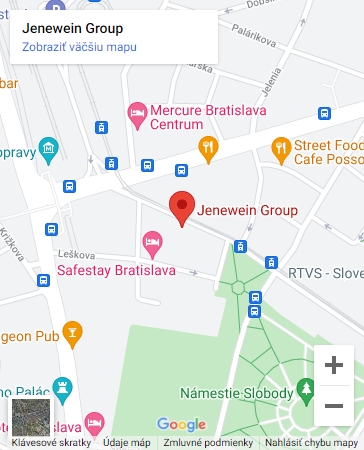Naše poradenské tímy sú aktívne v rámci globálnych partnerstiev a networkov, vďaka čomu dokážeme držať prst na pulze najnovšieho vývoja a v kombinácii s inovatívnymi prístupmi ponúknuť osvedčené riešenia v stredoeurópskom regióne i mimo neho.
Medzi našich klientov patria medzinárodné spoločnosti, české i slovenské firmy, investori, privátne holdingy, rodinné podniky, ale aj verejný a neziskový sektor. Naše poradenské tímy sa usilujú o vytváranie obojstranne výhodných partnerstiev a budovanie dlhodobých vzťahov.
Viac >>
Články & Štúdie
A few good men
There is a fight going on in CEE - a fight for talent. Strong GDP growth and constant inflow of foreign money and investors has driven demand for local talent able to fill top management positions. Companies are struggling to foster young talent in-house or seeking to import foreign executives.
It's one of the strange paradoxes of business that good times can make success more difficult. Years of solid economic growth has left the CEE labor market straining to meet the demands of business for skilled and experienced senior executives. Even some big global players have learned some hard lessons. Car manufacturers like TPCA and Hyundai in the Czech Republic both faced massive problems getting their workforce together. Hyundai management simply couldn't find enough skilled Czech workers and eventually started looking beyond the nation's borders to recruit people.
And the greater the skill set the more scarce the resource. The higher the required qualification, it seems, the harder it is to find the right person. "While two or three years ago, five or six suitable candidates could be found for a vacant executive position, today we are happy to find one," said Yvona Charouzdova, a senior consultant in the Prague office of executive search company Neumann International. "The market is dry, especially on the levels where executive or managerial skills are required."
The result? Companies don't only have to compete for market shares or customers, they have to compete for good managers and/or skilled staff at the same time. The situation favors people who want to change their jobs. They will meet open arms, everywhere. No wonder job mobility is growing, explained Mrs. Charouzdova.
LACK OF CHOICE
Although CEE governments like to tout their respective highly educated and motivated work forces, the reality is a little more complicated. Undoubtedly, CEE workers are skilled and motivated, but meanwhile many companies count themselves lucky if they can find skilled and motivated people to fill the higher management positions. "It is visible, that a whole generation of national business leaders is missing due to the political and economic orientation of the former eastern bloc countries," said Georg Unger, CEO for Central and Eastern Europe at A.T. Kearney. "The knowledge of many managers around 50 years of age, is in many cases not sufficient for the needs of a modern economy."
"The lack of experienced people is obvious," Mr. Unger continued, "There are many examples that show how tight the market is. One of our c1ients, for example, a well established Czech company, was looking for a new CEO, as the old one was about to retire. In the whole country, there was not a single candidate with the required profile."
People capable of meeting the demands of an executive level position, such as reliable leadership skills, sound business judgment, hands-on operational orientation, and strong analytical skills, are in short supply in all CEE countries.
Poland is another case in point. "We have a situation of a chronic shortage. It is a structural problem," explained Matthew Tebeau, managing partner of the Polish branch of executive search concern Ray & Berndtson. This, Mr. Tebeau explained, is due to several factors ranging from the lack of relevant executive experience prior to the 1989 revolution, to the fast and ongoing transformation of the Polish economy.
To cope with this problem, investors have to keep a few things in mind - along with being patient. "They have to be carefully prepared, and they need to do their homework to find the right executive. They should start early to search for the right people to manage their company, even if this may be time consuming," said Mr. Tebeau.
LOCAL VS. INTERNATIONAL
Choosing from among the domestic talent pool or looking beyond the country's borders is another significant question. Poland, for example, as the biggest regional market, is more "inward looking", according to Mr. Tebeau. Smaller countries in the region, such as the Baltic States, the Czech Republic or Hungary, are extremely internationalized in their business relations, he believes.
But can the problem of such countries be solved by importing experienced expatriate managers? Not completely, thinks Neumann International's Ms. Charouzdova. "The problem is that around 70% of the Czech companies with vacancies want executives that are familiar with the language and the culture of the particular countries," she said. "Even if the foreign executives may be top notch in terms of their business experience, they have to be familiar with the language and the culture of the country in which they are supposed to operate in."
But "cultural fluency" of ten takes a back seat when the need for a good person on the top is acute. For some companies, the outside appearance paired with Western style knowledge and experience is exactly what they are looking for. "One of our big Russian customers asked specifically for an expat senior executive. Their argument was that Western know-how was vital for further growth and business development, "A.T. Kearney’s Mr. Unger told FNE.
Igor Sulik, partner of executive search consulting firm Amrop Jenewein in Bratislava, was of a slightly different opinion than his fellow headhunters. He agreed with the common opinion of other executive searchers that the region suffers from a structural shortage of good managers: “Nonetheless, I think that there are still enough good men to be found across the countries of central and eastern Europe,” he said. “It is more a question of how good the networks and the market knowledge of the single executive searchers are. And additionally, the mobility of executives within the region is increasing.”
But he admits that many of his clients ask for expat executives as well, simply because there are not enough locals with the specific knowledge and experience needed for the job. “This is mainly due to a specific feature of Slovakia’s industrial infrastructure. The core the economy today is the automotive business. Three big companies operate factories in the country, Volkswagen, PSA and Hyundai-Kia. Therefore, the high demand for automotive managers is quite big and cannot be satisfied from nationals alone.”
KEEPING THE TALENT HAPPY
In future years, the shortage of experienced executives will not significantly increase, fears Brigittte Arhold, European director of the Association of Executive Search Consultants (AESC), a worldwide umbrella organization. "A complete generation of managers will retire over the next few years. At the same time, we also see a massive demographic shift in the CEE countries," she said.
To cope with this situation, she sees two options. The companies will either have to re-qualify local people, invest in their staff and support their mobility or, secondly, "import" the workforce they need. The first option is widely shared by all executive searchers surveyed by FNE. "The companies will have to take strong efforts to continually build up their own young talents. To keep the talented (employees) in your company you have to give them a vision and the feeling that they are important for the progress of the business," explained Mr. Unger. By way of example he spoke of a Romanian company in which an excellent but unsatisfied sales manager was about to leave. After Unger called the company's CEO, the sales manager was sent to Switzerland for a four-week training program. "It wasn't really much, but it made a big impression on this man. The subtext of it was simply, 'Hey, you are so important to us, we even want to invest in you.' And, what a surprise, the sales manager didn't leave."
Headhunters usually come in two flavors; “Retained” executive search firms charge a company up front to locate candidates for client openings. “Contingency” search firms get paid by employers only if they place a candidate. The payoff for both is around a third of the candidate’s first year’s salary.






















